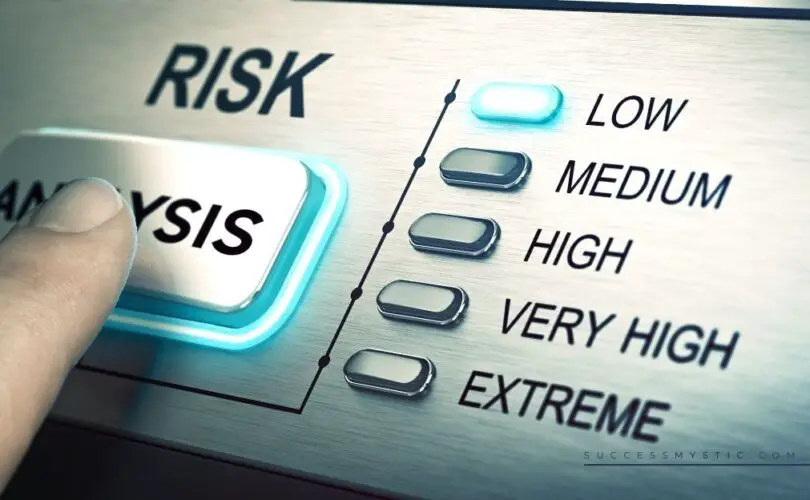The Only Certainty Is Change
Nothing in life is certain, apart of course from uncertainty itself. No one has a crystal ball, and no one can tell the exact outcome of the choices they make. If you cross the road, you don’t know for sure that you will make it safely to the other side. In fact, crossing the road carries a fairly high level of risk. It is safer than going in an airplane, for example.
Yet this is something most people are comfortable doing on a regular basis. If you get on a bicycle for the first time, you risk falling off; chances are, you probably will. However, this risk carries a gain, the ultimate pleasure of being able to ride a bicycle. The risk was worth its reward. You could classify this as a low-level risk. While you might sustain a few scrapes, scratches and bruises as you learn this new skill, you know you are unlikely to die in the process.
A high-level risk might be crossing Niagara Falls on a tight rope, with no net. The risk of death is much, much higher. Some people take risks such as these to attain the adrenaline rush that accompanies dangerous risk.
The French acrobat Charles Blondin in 1859 was the real-life dare devil who did just that, by all accounts taking pleasure in the gambles and bets people placed on whether he would live or die. He did succeed in his feat, although the betting odds were stacked against him doing so.
Think of the mother who risks her life to save her child. The benefit outweighs the risk.
Think back to childhood. What risks were you willing to take?
Small children, with their naturally curious approach to the world around them, are very likely to take risks, in their desire to learn, grow, and move. Some of them may be climbers, some may do back flips or somersaults, some may try squeezing through the bars in the railings to see if they can do it, and end up getting stuck!
Children fall into rivers, slide into mud, rock climb, jump off high places, climb trees, fall out of lofts, accidents occur, and for the most part, they survive and they learn.
Every time you take a risk and survive, what happens?
You learn something new about the world that you didn’t know before, and more often than not, you learn something about yourself, your own skills and strengths and capacities.
Risks Worth Taking
THE GREATER THE RISK, THE GREATER THE REWARD
Granted, taking risks can be a scary, stressful business. However, nothing beats the rush of succeeding. Some of the most successful entrepreneurs have been incredible risk takers, consider Warren Buffet, Bill Gates, Steve Jobs, Richard Branson, just to name a few.
They all were prepared to take massive risks and they made mistakes along the way, but ultimately, they succeeded. Steve Jobs started his little company in his garage.
Some people had to fail before they succeeded. In fact, it is said that you have to fail ten times before you succeed as an entrepreneur. Some of the greater known names throughout history of those who took risks and failed before they succeeded were Thomas Edison, and Albert Einstein. Edison, famously credited with the first light bulb patent in 1879, tested more than 3000 different bulbs before he came up with the best solution.
This could be seen as “failing” 3000 times. Einstein, widely considered as a genius, was thought to be slow as a child. He did not perform well in school and didn’t speak until he was nine years old. He struggled through university and ended up selling insurance. His father died believing Albert was a “failure.” But he went on to become one of the greatest physicists of all time. Risk taking is a scary business, and it is the fear of failure that holds us back.
Can you think of a way to reframe the concept of failure?
Failure is part of life, something that everybody must face. If you can see it as something normal and inevitable, and take away the shame and judgment from it, then nothing can really stop you.
As long as you don’t give up. Of course, fear of losing all your assets can be terrifying, when you have a family to feed, but hey, look at Donald Trump. Look where he got. Love him or hate him, you have to admire his unrelenting tenacity and commitment to his own success.
The Payoffs and Benefits Of Taking Risks
Here are some of the ways that taking risks can bring more richness and fulfilment into your life:
Life is short. It really is!
Do you want it to pass you by while you are playing it safe? Or do you want to spread your wings and fly? “Don’t die with the music in you.”
Do you want to be someone who leads a life of “quiet desperation” (as author Henry David Thoreau famously said)? Or do you want to share your gifts with the world, do what you love, follow your passion and be of service to humanity and the world?
In order to succeed, and reach your potential, you are going to have to take risks.
Falling Off A Ledge
There is a wonderful story of a monk who fell off a ledge; clinging to a branch that he grabbed onto as he fell, he kept his eyes tight shut, too afraid of the certain death that would befall him if he dropped.
When he finally let go, he was surprised to find that the distance was only a couple of feet! Letting go is one of the major lessons of Buddhist philosophy; letting go of outcome and success can help us live life more fully and more freely and be more willing to embrace risk.
As Thich Nhat Hanh says, “Letting go takes a lot of courage sometimes. However, once you let go happiness comes very quickly. You won’t have to go around search[ing] for it.” Letting go also allows us to embrace the experience of the present moment. Yogi Yogananda, who was famous for bringing yoga to North America in the 1920s, said, “If you stay in the present, the future takes care of itself.” Easier said than done, of course, but what a concept to live by!
Enrich Your Life
Set goals, timelines, and work to attain them. However, don’t remain too attached to the outcome. There is no permanence, only change. The successful entrepreneurs seem to have understood this and this has helped them to hold lightly to life and to its riches and rewards. This also makes the losses more bearable.
The Zen Buddhists speak about the ten thousand joys and the ten thousand sorrows. Think of the game of snakes and ladders as an excellent metaphor for the “game” of life. You roll the dice, and you just don’t know whether you will be the first to cross the line or whether you will land on the head of a snake and go tumbling all the way down to the bottom.
The point is, there is no perfect life, as so many of us are conditioned to believe. When I have that great job, I will be happy. When I find my true love, I will be happy. When I lose weight, when I buy a house, when I have a new car, or go on holiday, then I will be happy.
Life isn’t like this. There is always going to be negative stuff. Just when we think things are “going our way” something else shows up to knock us back down again.
This is why taking risks can enhance our lives. So what if we fail? So what? Society has it all wrong by seeing failure as something to be ashamed of! Failure is just part of success! It takes courage to take risks, for sure, but when you take a risk and succeed, just think of the rush, the joy, and the happiness!
You can enrich your life tremendously in this way. And if you fail, it’s no big deal, it’s just par for the course, and happens to us all. It is an unavoidable part of life.
Don’t Take Anything Personally
Following the wisdom of the Toltec practitioner Don Miguel Ruiz, once you realize that nothing in life is ever about you, it can help you manage gains and losses without feeling that your worth is intrinsically bound up with either of them. It’s not personal when something “bad” happens to you.
As Jim Carrey has recently stated, it is just things “happening.” Think about this: You are not your thoughts. You are not the thoughts in your head. They are just thoughts “happening.” You are not your body either. Your body is just something, which is “happening.” Moving, breathing, smiling or whatever.
Everything outside of you is just “stuff happening.” Thich Nhat Hanh states it like this: there is no separation. The stream in the forest is the same water that becomes the clouds you see in the sky. The clouds in turn become rain, which falls and turns into the stream.
The stream changes into the river and the river changes into the ocean. The ocean evaporates and becomes water vapor, which rises, collects, and forms into clouds. All of life is like this. When we realize this deeply, we are less attached to outcomes and more willing to take risks! The bottom line is nothing, absolutely nothing, in life is personal! Thich Nhat Hanh believes that the western mind is very divisive.
We like to separate things, dissect them, reduce them to their component parts, and break things down in order to examine them. In this way, we can see things as black versus white, good versus bad, success versus failure. If you take the separation out of things, then you realize there is no “us” and “them.”
There is no longer and “good” or “bad.” There just “is.” Everything just is. Viewing life in this detached way leads to greater tolerance for stress and taking risks, because you are less invested in the “successful” outcome.
Release Negative Thinking
Learning to let go of that which no longer serves you is also a way to help you take risks. Identifying your limiting beliefs can help you release them when you can see that they are firstly, false, and secondly, holding you back from reaching your potential and your success.
For example, perhaps, like so many, you have a deep-down belief that you are “not good enough,” or that you are “unworthy.”
Are you absolutely sure this belief is 100% true? How do you feel when you believe this thought?
If it is not 100% true, and it makes you feel (depressed, sad, scared, ashamed, you fill in the blanks), can you think of one, good reason to hold on to it? If not, declare that you are willing to let it go, and your subconscious mind will oblige by doing just that.
You now have a unique opportunity to reprogram your mind with a healthier, empowering, and inspiring belief. Perhaps it could be “I am acceptable just as I am,” or “I am loveable.” You decide what works well for you. Once you release your limiting beliefs, you will feel much more comfortable taking risks.
Another limiting belief could be. “I might fail.” This is a common fear that holds people back, but as you have already seen, this is not a helpful belief, as yes, you most likely will fail, and that is ok. Normal, and to be expected.
Therefore, you could drop that belief and change it to something more empowering and inspiring for you, for example, “I can handle all the ups and downs on the road to success with ease,” or whatever works for you.
The Acquisition Of Wisdom Is Associated With Risks
We don’t earn wisdom by hiding in our shell. Wisdom comes with experience, and being open to taking risks helps us gain that experience.
Find Meaning
This story essentially demonstrates that out of calamity comes a blessing. The story goes like this, a farmer lost his stallion, and all the local townsfolk all said this was very bad luck. However, the farmer just said, “good luck, bad luck, who knows.” Later the stallion returned bringing with him a herd of wild horses. The townsfolk thought this was very good luck. The farmer just said, “Good luck, bad luck, who knows?”
Then the farmer’s son broke his leg when he fell of one of those horses. Everyone thought it was bad luck, but…well…you know what the farmer said about it.
Then when the military came through looking for recruits, the farmer’s son could not go because of his broken leg. Good luck or bad luck?
Meaning is what we ascribe to an experience, rather than the experience being inherently good, or bad. Remember, the only constant is change.
Getting Started With Taking Risks
Take Calculated Risks
In order to take the edge off taking risks, it helps to be educated and informed about the choices you are making. If you can weigh the costs against the benefits of the risk you are about to take, you can know a lot more about your chances of winning versus losing.
Taking a calculated risk is a safer bet than a totally wild gamble! Essentially a cost benefit analysis is, in simpler terms, a weighing up of the pros and cons when it comes to a decision, or a risk. Do the benefits (pros) outweigh the costs (cons)?
This is a simple way to determine whether a risk is worth it. Always consider, before taking a risk, what the bottom line is, and are you comfortable living with it? Are you a natural born risk-taker, or do you prefer to tread with caution? Or are you a happy blend of the two? Either way, before you take the risk, be sure that you can live with the worst-case scenario.
Determine The Kind Of Risk-Taker You Are
This can give you insight into yourself and your personal make-up, in order to assess the level of risk that you are comfortable with.
Practice Taking Risks
If you feel you need practice with taking risks, here are some small steps to help you push the envelope. Get acclimatized with smaller risks first, so that you can take on bigger risks later.
Speak to a stranger. It might feel scary the very first time you do it. However, try it and see what happens.
How did you feel? What was their response to you?
Did they smile and chat back? Or were they surly and rude?
Did the benefits outweigh the costs?
Try it ten times with different people. Decide whether this is a risk that you are willing to try again. Another thing you might notice, depending on the scenario, is that the level of risk diminishes as you become habituated to the act.
Ask someone on a date. Ok this can be very scary of course! However, what is the worst- case scenario? They say “No,” you feel hurt for a while and perhaps a little humiliated. What is the best-case scenario? They say “Yes,” you hit it off, really like each other and pretty soon, you’re a serious item!
Tell someone you love them. Nobody wants to be the first one to say it, but somebody has to go first. The best scenario is your loved one will return the love to you. The worst-case scenario of course, is that they do not feel the same way about you.
However, the silver lining in this cloud is that you get to know what they really feel about you and you can then decide how to proceed, or, how not to. At least you will have gained some clarity.
There is always a lesson to be learned from our mistakes and so-called failures. Which would you prefer: To carry on with this person, not knowing how they feel about you, or to be absolutely sure that they are being honest and authentic with you.
Speak up for yourself. If something is causing you grief, whether at work or with a friend or loved one, tell the person concerned, what you feel unhappy about and what you want to change. Ask them to help you. Stick to the facts of the matter and try not to evaluate or interpret what happened.
Practice with an impartial friend if you need to. Speaking your truth can feel very risky because you don’t know how the other person will react. Perhaps they will feel angry and react explosively? This is a risk. Remember that you are not responsible for another person’s reaction.
Make mistakes. Everybody does. Next time you do, try to be kind, forgiving, and compassionate towards yourself rather than beating yourself up. Know that making mistakes is a normal part of being human, and that it is through these mistakes that we can learn valuable lessons about life.
Do something you’ve never done before. Challenge yourself to do something new. What is the bottom line? If it is something you could break your neck doing, you may want to get rained and take the necessary safety precautions! Remember, you want to take a calculated risk, based on education and information.
Just because it is a risk doesn’t mean you have to be stupid about it! You can still be smart, stay safe, and experience the absolute thrill of doing something totally new and exciting!
Whether it’s parachuting, riding in a hot air balloon, skydiving, or learning to fly a microlight aircraft, or something more earthbound like taking up a new sport like curling, or going ballroom dancing, you get to choose, weigh up the pros and cons, and then…go for it!
Create a bucket list and set about accomplishing the things on it. Nobody knows how much time they have on this planet, and the only time to “seize the day” is now. The Tibetan Buddhists say that, “Death can come at any moment.” Therefore, we should be prepared, and be prepared to grab any opportunity we can to live life to the fullest. What will you put on your bucket list?
Final Thoughts
Change is the only constant. Life is all about taking risks. Nothing is certain, and we never know how much time we really have. How comfortable are you with taking risks? What are the limiting beliefs that hold you back, and how might you reframe them?
Can you reframe the concept of “failure,” seeing it as a tool, which helps you learn and grow, and is an inevitable fact of life? Often, a so called “failure” brings with it a hidden reward, a “silver lining” that ends up being a bonus.
Entrepreneurs typically have to fail, perhaps many times, before they succeed. Sometimes, taking a risk is like falling off a cliff, only often the drop is not nearly as far as we had feared. Letting go can be hard, but when we do, when we let go of our attachment to outcome, we can be more likely to take risks, and more likely to be happy in the moment also.
Realizing that absolutely nothing in life is personal can help us to be more confident in owning our own truth and in doing what is right for us. This can include risk-taking, regardless of what others think or say about us. Take calculated risks by knowing the pros and cons, or the cost/benefits, of your undertaking.
Figure out what kind of a risk-taker you are, so you can act within your particular comfort zone.
Practice pushing the envelope by taking smaller risks first, then progressing to taking bigger risks as you gain confidence in your successes, while remaining philosophical about the “failures.”
Life will be richer, more enjoyable, and more fulfilling. Good luck, bad luck, who knows?







